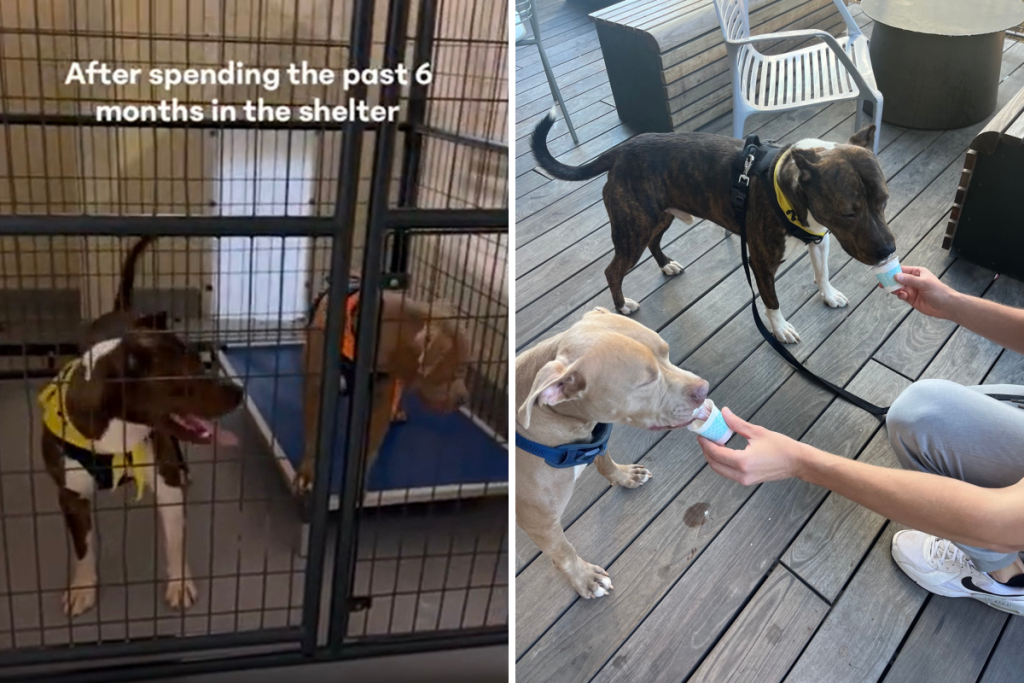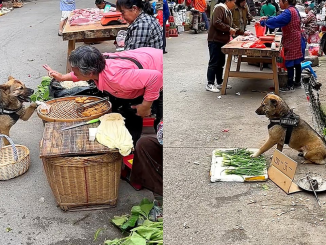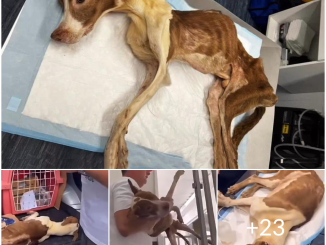
Living in a shelter can be hard for animals but these two pit bull terriers have managed to make the best out of a bad situation.
Moon Pie and Clipper, both two years old, have been joined at the hip for the past six months in Lifeline Animal Project, an intake shelter for stray dogs in Atlanta, Georgia.
Recently, Connor Abdo, an animal welfare advocate, treated the “best friends” to a day on November 5 and captured all of their fun on camera.
“The shelter is a very stressful environment for the dogs so having a friend is really helpful,” Abdo told Newsweek.

From making friends with strangers to slurping a puppuccino, Abdo said, “they had the best day ever.”
The video was uploaded to Abdo’s dog supply business, @salvation_bark, on TikTok, where shelters receive a donation of half the proceeds.
During the video, the pair can barely contain their excitement as they smile while riding in the back of Abdo’s car. It soon becomes clear that they weren’t shy and are willing to greet everyone they meet.
“They are the definition of you can’t judge a book by its cover. They are both big softies who love kisses, other dogs, and playing,” Abdo said.
However, the video has a bittersweet twist because it’s the final time the tan and white dog, Clipper, will play with Moon Pie, as he has since been adopted.

“It is sad for Moon Pie that his friend is gone but we are confident he will be adopted soon. It is difficult to find an adopter willing to take both dogs though.
“Moon Pie would thrive in any environment. He’d love a dog friend,” Abdo said.
So far, the clip has over 6,000 views and more than 1,000 likes along with plenty of comments.
One user said: “I’m a volunteer and I do this for all the long term dogs at a local shelter. They needed that much needed break from the shelter. So thank you!!!”
Another pointed out: “They seem so well behaved!”
“Such softies who just need love,” said another person.
Another said: “I hope they find forever homes soon.”

Recently, a shelter volunteer showed the reality of living in a shelter for one dog who is yet to be adopted after 1,058 days. But dreams do come true, as proven by Nova, a dog who has finally found a loving family to call her own after more than two years in a shelter.
Mother Dog Attempts to Care for Four Tiny Pups Despite Being Left by Owner and Having Both Legs Crushed by a Train

It’s impossible not to weep when you see the tragic predicament of abandoned stray dogs. However, not every mother dog is as courageous, tough, and protective of her children as Si Bao.

After being “mercilessly abandoned” by its owner, this dog was engaged in a tragic accident in which her hind legs were crushed by a train. Si Bao’s life appeared dismal until she gave birth to four very gorgeous and healthy pups, who practically became the driving force in this miserable mother dog’s existence.

After recovering the pleasure of living in life after having children, Si Bao restored her spirit and always kept a resilient and strong attitude to take care of her children. Si Bao walked on two front legs, keeping a watchful eye on the children.

Si Bao’s luck continued to smile when the Jill Robinson-founded nonprofit Animals Asia rescued his family and made this heroic mother dog an animal ambassador. As a consequence, Si Bao has been transferred to the organization’s headquarters, where he may begin a new life with his kid rather than struggling to earn a livelihood off the scraps of food that travelers throw away at the train track. His sole surviving is Muddie.

Furthermore, Si Bao has been renamed Lelly, and she is planning to install wheeled prosthetic legs to allow her to move more freely. Three of Lelly’s four pups died of high fever when the organization found them, leaving just Muddie.

Lelly is currently living the good life as a “Asia animal” ambassador for Animals.

Even though she is just a little dog, Lelly exemplifies an unbreakable character that does not give in to hardship.



Leave a Reply